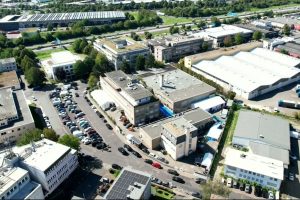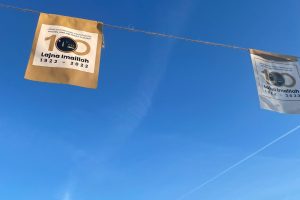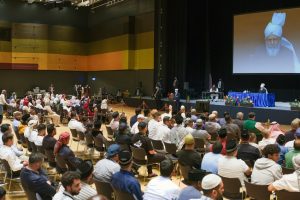
Introduction
Hazrat Mirza Masroor Ahmadaba, Head of the worldwide Ahmadiyya Muslim Community and Khalifatul Masih Vaba, undertook a twelve day tour of Germany in June 2013. His Holiness presided over the Jalsa Salana (Annual Convention) Germany, inaugurated two mosques and laid the foundation stone of another mosque. To enhance the religious and spiritual training of his followers, His Holiness led the five daily prayers in congregation, delivered Friday sermons and presided over classes with youth of the Community. His Holiness also found time in his busy schedule to grant private audience (Mulaqaat) to thousands of Ahmadis travelling from all over Europe and attend the celebrations of the first reading of the Holy Qur’an (Ameen Ceremony) and Nikah ceremony (announcement of a marriage). His Holiness held press conferences and delivered keynote addresses to the local German population to promote the peaceful message of Islam.
The following is part one of a two-part coverage of the tour.
22nd June 2013
After a silent prayer, Hazrat Mirza Masroor Ahmadaba left the Fazl Mosque in London and began his journey to Germany. The official duties of His Holiness continued even whilst travelling; during the journey, His Holiness inspected administrative documents and issued relevant directives. Hazrat Khalifatul Masih Vaba was warmly welcomed by dignitaries and officials of the Ahmadiyya Muslim Jama’at (Community) in Germany, in the town of Wettern. His Holiness led the afternoon prayers in a local restaurant, followed by lunch. The blessed convoy drove across Belgium to Germany, arriving at Baitus Subuh Mosque in Frankfurt at 8.45pm. The arrival of Hazrat Khalifatul Masih Vaba at Baitus Subuh was a most joyous occasion for Ahmadis in Germany; nearly 1,000 dedicated followers, some of them having had travelled from as far as Berlin, gathered to welcome their beloved Khalifah. At 9.50pm His Holiness led in the evening prayers before retiring to his residence.
23rd June 2013
His Holiness led the congregational dawn prayers in Baitus Subuh Mosque and thereafter attended to his varied administrative responsibilities. At 11.25am, His Holiness presided over a class of Waqfeen-e-Nau girls (youth who want to dedicate their lives wholly to the service of the Community). After the recitation of the Holy Qur’an, a Hadith was presented, (saying of the Holy Prophetsa) highlighting the importance of preaching the message of guidance. One girl read out an extract from the writings of the Promised Messiahas, Hazrat Mirza Ghulam Ahmad, Founder of the Ahmadiyya Muslim Community, which emphasised that one should exercise tolerance and patience while delivering the message of guidance. Other presentations focussed on the relevance and techniques of preaching in today’s world, the qualities of a good preacher and the value of education for the success of preaching activities. A candid question-and-answer session with His Holiness followed covering wide-ranging issues. The key points from the answers given by His Holiness are summarised below:
The length of the congregational prayers in Islam is varied; the Imam takes into account that children, older people and the sick may be offering the prayers in congregation and that they will be inconvenienced if it is too lengthy. His Holiness said that his practice is that if he hears someone coughing or a child crying, he shortens the prayer as was the practice of the Holy Prophet Muhammadsa.
Islam encourages women to play an active and useful role in society. The division of labour is such that men are responsible for the duties outside the home and women have a key role in the management of household affairs. It is the job of women to bring up their children well; women are encouraged to invest their knowledge and skills in the training of their children, to enable them to become useful members of society. Allah the Exalted has not prohibited women from attaining professional training and competence. The Holy Prophetsa said that to acquire knowledge is a mandatory requirement for both men and women. The status of women is so high in Islam that the Holy Prophetsa said to his followers that they could learn half of the faith from ‘A’ishahra (noble and pious wife of the Holy Prophetsa). In the West, the recognition of women’s intellectual and academic abilities only took place within the last century; Muslim women were given these rights with the advent of Islam.
In response to a question, His Holiness said superstition and taking of omens is not acceptable. The practice of taking omens is like associating partners with Allah.
His Holinessencouraged the practice of giving charitable donations every day of the week and recommended Save the Children and similar charities such as Humanity First, which help hospitals and orphanages in poorer countries.
His Holiness explained that sometimes children are labelled “hyperactive” inappropriately. Parents should try and understand the nature of their child and have a tactful manner. Sometimes parents give in to a child’s tantrum and as such the child learns that by throwing tantrums they will get their own way. If parents ignore these tantrums then children will understand that this is not the way to behave. Some parents always say no to everything that their children ask for; this also makes children resentful. Parents must understand their children’s psychology and treat them accordingly.
Thereafter, His Holiness presided over a class of Waqf-e-Nau boys. The class began with the recitation of the Holy Qur’an, presentation of a Hadith, followed by extracts of the writings of the Promised Messiahas.
The next presentation discussed the importance of training as a missionary and attending Jamiah (an Ahmadiyya theological institute for training missionaries). The syllabus was further elaborated upon as well as the other educational opportunities available at Jamiah. Along with the broad theological knowledge that students are expected to acquire, German, Urdu, English and Arabic languages are also taught. In the senior years, students study history, comparative theology, the Persian language and logic and must complete a thesis in their final year. Trainee missionaries participate in sports for at least one hour per day and inter-house competitions for knowledge and skills are a pivotal part of Jamiah life. The curriculum of the worldwide Jamiah, whether in Pakistan, Indonesia, Canada or Germany, is uniform and examinations are of the same standard. His Holiness directed that at least twenty of the Waqf-e-Nau from Germany should go to Jamiah. His Holiness said that to go to Jamiah should be the first priority of Waqf-e-Nau males.
In an interesting question-and-answer session, Hazrat Khalifatul Masih Vaba explained that it is acceptable to perform embryonic research in the laboratory for the purpose of treating future ailments. It is not acceptable to take a growing foetus out of a mother’s womb to carry out scientific research. Other questions were answered relating to the finer points about prayers, Salat (formal prayer in Islam) and charity. One dedicated youth was advised to pursue a Masters degree in construction engineering, researching durable materials for building mosques. These dedicated young men were advised to hone their teaching skills, become proactive in preaching, remain focussed on prayers and supplication and persevere with their studies. In response to a question, His Holiness said that the youth should undertake regular exercise to become fit and manage their weight well. His Holiness expressed the importance of truthfulness and Sadaqah (alms) while pursuing asylum cases. The history of the Partition of India for the protection of Muslims was discussed. Hazrat Khalifatul Masih Vaba explained that the Nur (spiritual radiance) on the face of the prophet is recognised by a person with a pure heart only. This is why some unfortunate people missed the opportunity to accept the truthfulness of the Holy Prophet Muhammadsa, despite living in his era and even within the same town as him. This class finished at 1.45pm, thereafter Hazrat Khalifatul Masih Vaba led an Ameen (ceremony after the first complete reading of the Holy Qur’an) ceremony of several children from all over Germany, followed by afternoon prayers in congregation.
24th June 2013
His Holiness set off for Flörsheim to inaugurate the Baitul Ata Mosque. Hazrat Khalifatul Masih Vaba was received by local dignitaries, council officials and key members of the Ahmadiyya Muslim Jama’at. The local Ahmadis were full of devotion, commitment and excitement to see their holy master in Flörsheim. The history of Ahmadiyyat in the area stretches back to 1988, when the first Ahmadis arrived in this town. The local Ahmadiyya Community had been trying to build a mosque in the town since 2006. After overcoming many hurdles and challenges, a site was finally bought in 2012. The local Ahmadiyya Community made immense financial sacrifices in order to convert the site of the local market into a functioning mosque.
In his address at the inauguration ceremony of the mosque, the Mayor of Flörsheim praised the Ahmadiyya Muslim Community for their spirit of integration in the local community. After addresses from local dignitaries, Hazrat Khalifatul Masih Vaba thanked all the guests for their kind participation. His Holiness was particularly grateful to the native Germans for their support. Hazrat Khalifatul Masih Vaba said that in a mosque one receives eternal spiritual nourishment that enhances one’s interactions with God as well as with other human beings. His Holiness said that we believe that anything that one is given is bestowed by God. Hence the name of the mosque, “Baitul Ata,” which means “the house of One, Who has the capacity to bestow everything.” His Holiness reiterated the Islamic message of peace, security, loyalty and mutual love and understanding, in his address. Thereafter, Hazrat Khalifatul Masih Vaba left for Frankfurt at 8.50pm. In Baitus Subuh Mosque in Frankfurt, Hazrat Khalifatul Masih Vaba presided over an Ameen ceremony for 27 fortunate children. At the end of his official day, Hazrat Khalifatul Masih Vaba led the evening prayers in congregation, before retiring to his residence.
The inauguration Baitul Ata and the laying of the foundation stone of the mosque Baitus Subhan was extensively reported in both print and electronic media in Germany. The newspapers Frankfurter Rundschau, Frankfurter Neue Presse, Main Taunus Kurier, Main Spitze, Echo Online and Hochster Kreisblatt, extensively reported on the inauguration ceremony. They also quoted His Holiness, that from a market place you can only gain things of material benefit that are short-lived, but from a mosque eternal spiritual benefits are attained. The Ahmadiyya characteristics of integration into local communities, volunteer work and financial sacrifices, were highlighted in these reports.
25th June 2013
The official day of His Holiness began at 4.15am by leading the dawn prayers in congregation. After attending to his wide and varied official commitments, His Holiness attended meetings with key officials of the Ahmadiyya Muslim Community. After these meetings, 155 members of 36 families had the blessed opportunity to benefit from the blessed company of Hazrat Khalifatul Masih Vaba, during Mulaqaat (private audience). These few precious moments are perceived as deeply spiritual and emotional moments, wherein Ahmadis are able to seek advice on personal matters, and request support and prayers from their revered and beloved leader. After leading the silent prayers at 5.15pm, Hazrat Khalifatul Masih Vaba left Frankfurt for Neuwied, to attend a Mayoral reception. In his welcome address the Mayor emphasised their philosophy of religious freedom. The Mayor presented His Holiness a beautiful wooden box with traditional art, specific to the city of Neuwied. In his address, His Holiness thanked the Mayor for his kind remarks and reiterated the commitment to mutual support and integration. The Mayor escorted Hazrat Khalifatul Masih Vaba to his car at the end of the programme at 7pm. A full police escort was granted to the motorcade of Hazrat Khalifatul Masih Vaba, to the site of the inauguration of the Baitur Raheem Mosque. His Holiness was received by the local council and dignitaries of the Ahmadiyya Community.
The first Ahmadis arrived in the town of Neuwied in 1985. At the time, the local Ahmadiyya Community consisted of only 17 people. Now, Neuwied has a thriving and active Ahmadiyya Community consisting of 160 people. In his keynote address, Hazrat Khalifatul Masih Vaba thanked the German government for allowing religious freedom to the Ahmadiyya Muslim Community. A large number of Ahmadis had to emigrate from Pakistan in order to escape intense persecution. Ahmadis in Pakistan are deprived of their human rights, are treated unfairly and face many hardships. The German government not only granted these persecuted Ahmadis asylum, but also gave them religious freedom. Hazrat Khalifatul Masih Vaba reminded local Ahmadis that it is their religious responsibility to be faithful and loyal to the country they live in and that they should make every effort to integrate in the local community while adhering to their religious values. His Holiness highlighted the importance of interfaith meetings and conferences in this regard. Hazrat Khalifatul Masih Vaba led the silent prayers at the end of the ceremony at 8.20pm. After a long and emotional farewell, Hazrat Khalifatul Masih Vaba set off for Frankfurt under police escort and was shown official protocol. In Baitus Subuh Mosque Hazrat Khalifatul Masih Vaba led the evening prayers in congregation at 10pm, before retiring to his residence. There was good media coverage, both in print and electronic, of the ceremony of the inauguration of the mosque.
26th June 2013

After leading the early morning prayers in congregation, Hazrat Khalifatul Masih Vaba attended to his wide and varied officially commitments as the Head of the worldwide Ahmadiyya Muslim Community. At 11.30am His Holiness granted Mulaqaat (private audience) to 173 members of 37 families, followed by an Ameen ceremony for 24 fortunate children.
After leading silent prayers, His Holinessset off to the town of Fulda, where many dedicated men, women and children, warmly welcomed their holy master. Hazrat Khalifatul Masih Vaba was received by the dignitaries of the local Ahmadiyya Community as well as dignitaries from local councils and religious leaders. The ceremony of laying the foundation stone of Baitul Hameed started with the recitation of the Holy Qur’an. In his address, the Ameer (National President) of the Ahmadiyya Community Germany presented the history of Ahmadiyyat in Fulda.
The first Ahmadis arrived in Fulda in 1980s. From its humble beginnings of 10 families, now there is a well-established and well-integrated Ahmadiyya Community in Fulda. The address of the City Councillor recognised the contribution of the Ahmadiyya Muslim Community in the city of Fulda and expressed the hope that the mosque in Fulda will become a symbol of peace, security and extended mutual collaboration. The leader of the Evangelical Church warmly welcomed the idea of building a mosque in Fulda.
In his keynote address, His Holiness thanked all the guests for their kind support. His Holiness explained the philosophy behind the name of the mosque—Baitul Hameed, which literally means “house of the One praised abundantly.” A Muslim is expected to pray five times a day and in every prayer, a Muslim is commanded to say, “All praise belongs to Allah, Lord of all the worlds.” This is a reminder that Allah is the Lord of Muslims, Christians, Jews, Hindus and all other human beings. By praising God five times a day, we enhance our commitment to the values of humanity. This prayer focuses our mind towards the respect and dignity of all human beings. His Holiness expanded the concept of the Islamic teaching that “deeds are judged by intentions”; the true intention behind any action should be to please Allah; God is the Lord of all the Worlds and loves all His creations. His Holiness laid the foundation stone for the mosque and led the silent prayers.
Hazrat Khalifatul Masih Vaba was then interviewed by the national German TV channel, ZDF, where he promoted the peaceful message of Islam. The reporter who interviewed His Holiness attended the ceremony and asked about the importance of building mosques. His Holiness replied that by building mosques we aim to promote unity in the worship of God. We would like visitors to clarify any misunderstandings about Islam for themselves, by visiting the mosque. His Holiness expounded that Ahmadis are instructed to integrate and serve the local community, while adhering to their religious values. He explained that there are some aspects of German culture that we will be happy to adopt. After leading silent prayers, His Holiness travelled back to Frankfurt where after the congregational evening prayers, he retired to his residence.
27th June 2013
His Holiness attended to his official commitments from the dawn prayers until the afternoon prayers, which he led in congregation. At 6.15pm, the motorcade Hazrat Khalifatul Masih Vaba set out to Karlsruhe, where the Jalsa Salana (annual convention) of the Ahmadiyya Muslim Community, Germany, was to take place at Karlsruhe. On his arrival at 8.20pm, the Officer Jalsa Salana (responsible for overall arrangements of the convention), warmly welcomed Hazrat Khalifatul Masih Vaba along with his team. Hazrat Khalifatul Masih Vaba inspected the preparation for the convention, starting from the card checking system at reception. Scenes from outside the main marquee were broadcast by MTA Germany, facilitated by a drone camera. MTA, Muslim Television Ahmadiyya International, is the official satellite channel of the Ahmadiyya Community. Speeches were translated simultaneously into 11 different languages. His Holiness inspected the accommodation for the foreign guests and the arrangements for catering for the large number of guests. Hazrat Khalifatul Masih Vaba also inspected the departments of: the main kitchen facilities, hospitality, public services, private bazaar and family accommodation in tents and caravans. In his address to the volunteers, Hazrat Khalifatul Masih Vaba stressed the importance of serving the guests of the Promised Messiahas, explaining that it is an immense privilege and this blessed opportunity should be availed to please God. At 10.10pm Hazrat Khalifatul Masih Vaba led the evening prayers, before retiring to his temporary accommodation within the site where the convention would be hosted.
Part II to follow in the next edition.




Add Comment